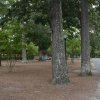High court hears Lingo estate battle
A dispute between brother and sister that will put the landmark Lingo’s Market property in Rehoboth Beach on the auction block Saturday, May 1, also led this week to a hearing before Delaware’s Supreme Court.
|
Chancery decision gives background
|
|
The final Chancery Court ruling on the will and trust assets, issued in February 2009, provides a glimpse of the atmosphere and depth of the dispute.
In his opinion discussion, Master Sam Glasscock wrote: “The true impetus for this litigation is the unfortunate mutual antipathy between Archie and Dinah. Their dislike goes beyond mere sibling rivalry and includes behavior unbecoming to business people of mature years, reaching its zenith – or nadir – in a public brawl between Archie and Dinah in August 2006 that required police intervention. The extreme dislike between brother and sister permeated the trial in this matter and tends to taint the testimony of the principals involved. This antipathy, quite sincere in its own right, is no doubt exacerbated by the fact that the outcome of this litigation will determine whether several million dollars in assets are ultimately inherited by either Archie or Dinah, upon the demise of the nonagenarian Mrs. Lingo. If the transfers to Dinah and the 2002 will fall, Archie will inherit half of the combined estate and trust; if they stand, he will inherit one quarter only.” The Saturday, May 1 auction ordered by Chancery Court for sale of the Lingo properties at First Street and Baltimore Avenue in Rehoboth Beach is at the request of both Archie and Dinah, who have asked that the properties be liquidated. The Lingo trust will receive proceeds of the sale which will then, presumably, be divided in accordance with trust ownership: three quarters to Dinah and one quarter to Archie. |
Archie Lingo and Dinah Lingo of Rehoboth Beach are battling over who should inherit how much of millions of dollars’ worth of cash, stocks and real estate that belonged to their mother, Eleanor Lingo
, who died in November 2009.
This week’s oral arguments before Delaware’s Supreme Court Chief Justice Myron T. Steele and justices Carolyn Berger and Jack B. Jacobs focused on one facet of the dispute.
Following court proceedings initiated by Archie Lingo in 2008 and 2009, prior to Mrs. Lingo’s death, Chancery Court Master Sam Glasscock ruled Dinah Lingo abused the power-of-attorney authority granted her by her mother and misdirected hundreds of thousands of dollars of her mother’s money for her own personal use. The court agreed to appoint an independent guardian to supervise Mrs. Lingo’s assets, as requested by Archie.
However, the court disagreed with Archie that Mrs. Lingo’s will was invalid. Describing her son as “money grubbing” and uncaring, Mrs. Lingo’s will specifically disinherited Archie and gave all of her assets to Dinah. (Issues related to the will came up prior to Mrs. Lingo’s death because of concerns about her mental competency.)
The Chancery Court ruled Dinah had to return to her mother the money she had removed to her own accounts and had to account for rental income from several Rehoboth Beach-area properties – estimated to be in the vicinity of $1.5 million – that she had been managing since 2005. Still, because the court found the will is valid, Dinah inherited all of her mother’s assets when Eleanor Lingo died. Those assets include cash, stocks and real estate.
The real estate holdings, including numerous houses, apartments, storefronts and land in the Rehoboth area, were all placed in a trust prior to the 1981 death of Mrs. Lingo’s husband, Bill. By the terms of the trust, Mrs. Lingo, upon her husband’s death, retained half the value of the real estate holdings while Archie and Dinah would eventually receive the other half, split equally.
When Mrs. Lingo died in November 2009, Dinah’s inheritance included Mrs. Lingo’s half interest in the real estate holdings, which made Dinah the three-quarter owner of the holdings, with Archie retaining the quarter interest he had inherited at his father’s death.
According to the Chancery Court ruling, “Archie’s share will still be valued in the millions of dollars.”
The ruling also made Archie eligible for reimbursement, from his mother’s assets, of legal expenses pertaining to seeking a proper guardian for his mother’s assets and the wrongful conversion of trust assets. Total associated legal fees are estimated to exceed $1 million. Archie sought one-third of those fees as reimbursement. The exact amount is still to be determined.
The question to be decided by Delaware’s Supreme Court, following this week’s hearing, is whether a trustee, who has wrongfully converted trust assets – in this case Dinah – should be able to inherit those same assets under estate law. Archie filed the appeal to the Supreme Court questioning whether those misappropriated funds should be returned to the trust, which Dinah inherited.
Archie’s attorneys argued that his ultimate share might have been diminished by the wrongful conversion, but because of poor bookkeeping and other factors they said it was difficult to determine by how much.
Dinah’s attorneys argued that since Dinah inherited all of her mother’s assets anyway, to which she was to have returned the wrongfully converted funds, no real harm was done to Archie. Where there is no harm, they argued, there is no need for remedy. The court’s decision will come in the weeks ahead.


















































